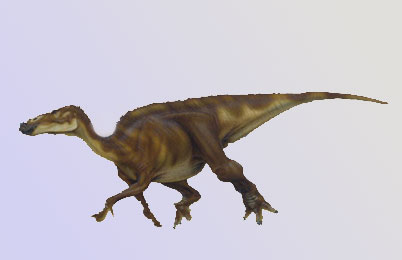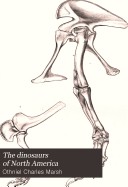Claosaurus, (meaning "broken lizard"), was a prehistoric hadrosaurid (duck-billed dinosaur) living throughout the Santonian Age of the Late Cretaceous.

Evidence of its continued existence was first found near the Smoky Hill River in Kansas, USA in the form of incomplete skull fragments and as an uttered postcranial skeleton. Originally called Hadrosaurus agilis (Marsh, (1872), it became known as Claosaurus agilis in 1890 when major differences among this specimen and the Hadrosaurus came to light.
Claosaurus had a slim body and slim feet, with long legs, small arms, and long, stiff tail. It almost certainly grew to a length of about 12 to 15 feet (3.5 meters) and weighed roughly 470 kg.
The specimen of Claosaurus agilis is in the Yale Peabody Museum. Claosaurus is one of the most prehistoric hadrosaurids and appears to have retained the first metatarsal in its foot, a feature which other hadrosaurids lost.
It appears to have walked on its hind legs, plummeting to all fours only to graze. Like other hadrosaurs, it was an herbivore.
Original, as described by Marsh, 1872:
1. Notice of a new species of Hadrosaurus; by O. C. MARSH. In the middle
of the Reptilian remains obtained by the Yale College party throughout
the past summer (1871) was the better part of a skeleton of a small Hadrosaurus,
discovered by the writer in the blue Cretaceous shale near the Smoky Hill
River, in Western Kansas. This species was somewhat lesser than H. minor
Marsh, from New Jersey, and hardly more than one-third the bulk of H.
Foulkei of Leidy. It was of more slender proportions, with the tail much
elongated.
The cervical vertebras are proportionally shorter than in H. Foulkei, and the caudals appear denser, some of the distal caudals have a longitudinal ridge on the lateral surface. The sacrum, which is calm of six confluent vertebras, is 414 mm. in length. The first caudal vertebra is 62 mm. in length. The feet are nearly entire, and are proportionally more slender than the known leftovers of the other species would indicate. The third metatarsal is 235 mm. in length and 77 mm. in slanting diameter at its distal end. This species, which may be called Hadrosaurus agilis, will be fully described in this Journal at an early on day.
| Claosaurus facts: | ||||||
|
 |
Restorations of Claosaurus and Ceratosaurus |
 |
The dinosaurs of North America |